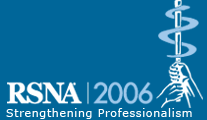
Abstract Archives of the RSNA, 2006
Yueyong Xiao PhD, Presenter: Nothing to Disclose
Jinshan Zhang PhD, Abstract Co-Author: Nothing to Disclose
Ozone therapy is a minimally invasive treatment for cervical disk herniation. We are proposing to evaluate the therapeutic outcome of CT-guided ozone treatment for cervical disc herniation.
All 86 patients cervical spondylosis including type of myelopathy 37 cases, type of radiculopathy 30 cases, and sympathetic type 16 cases were treated with O3 injection under the guidance of CT. The puncture rout was from the antero-paraline of neck to the disk. A total of 2-7 ml of ozone with concentration 60μg/ml were injected both to disk and 5ml of ozone with concentration 40μg/ml were injected to the paraspinal tissue. Therapeutic outcome was assessed 3 months after treatment by using a modified MacNab method.
After injection of ozone, CT scan showed that ozone was distributed into disk and extruded disc material in type of myelopathy and type of radiculopathy after injection; and distributed into anterior epidural space and paraspinal tissue in sympathetic type. The excellent, good and poor clinical efficacy was 78%, 16% and 6% respectively 3 months after treatment.
CT guided ozone injection is an accurate, safe, and effective method in the treatment of cervical disc herniation.
CT guided ozone injection is an accurate, safe, and effective method in the treatment of cervical disc herniation.
Xiao, Y,
Zhang, J,
CT Guided Ozone Injection for the Treatment of Cervical Disc Herniation. Radiological Society of North America 2006 Scientific Assembly and Annual Meeting, November 26 - December 1, 2006 ,Chicago IL.
http://archive.rsna.org/2006/4428044.html

